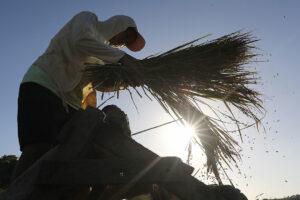Marcos OK’s adoption of hybrid rice

PRESIDENT Ferdinand R. Marcos, Jr. has approved the adoption of hybrid rice to increase rice production in the country, according to Malacañang.
He made the decision after a meeting with top executives of SL Agritech Corp., which the Presidential Communications Office (PCO) said had proposed to use hybrid rice seeds in 1.9 million hectares of land that are currently planted with certified seeds.
“President Marcos said he will implement a program to promote the shift by providing subsidies and facilitating loan financing to farmers,” the PCO said in a statement.
The company, which was represented by its Chairman and Chief Executive Officer Henry Lim Bon Liong during the meeting, is engaged in the development, production, and distribution of hybrid rice seeds and “premium quality rice,” the Palace said.
During the meeting, Mr. Lim Bon Liong said hybrid technology will give farmers better income and help the country achieve rice sufficiency.
Hybrid farmers have harvested around 7 to 15 metric tons (MT) per hectare as compared with the average 3.6 MT per hectare for inbred seeds, according to the Palace.
Citing a joint study by the Department of Agriculture (DA) and local government units (LGUs), the Palace said hybrid seeds have given 41% better yield than inbred conventional seeds.
“From January to November 2022, the National Rice Program served 1.06 million rice farmers and 3,528 farmer cooperatives through the provision of hybrid and inbred or certified seeds, production-related and post-harvest machinery, small-scale irrigation, as well as extension and training activities,” it said.
The Philippine government has been pushing for the hybrid rice system to increase the productivity of farmers for the short term and achieve rice self-sufficiency for the long term.
Climate change and the high costs of farm inputs including seeds affect the Philippines’ ability to produce enough rice for its people.
The Philippines hybrid rice seed market could generate a compound annual growth of 5.2% from 2023 to 2027, according to a report by Mordor Intelligence, Inc.
The PCO said Mr. Marcos has also vowed to “apply the best practices being done by Central Luzon farmers to other areas in the country.”
It said state-run banks Landbank of the Philippines and Development Bank of the Philippines have granted P3.37 billion in zero-interest and non-collateral loans to 10,643 rice farmers and 197 borrower organizations and cooperatives under the Rice Competitiveness Enhancement Fund Program. — Kyle Aristophere T. Atienza




